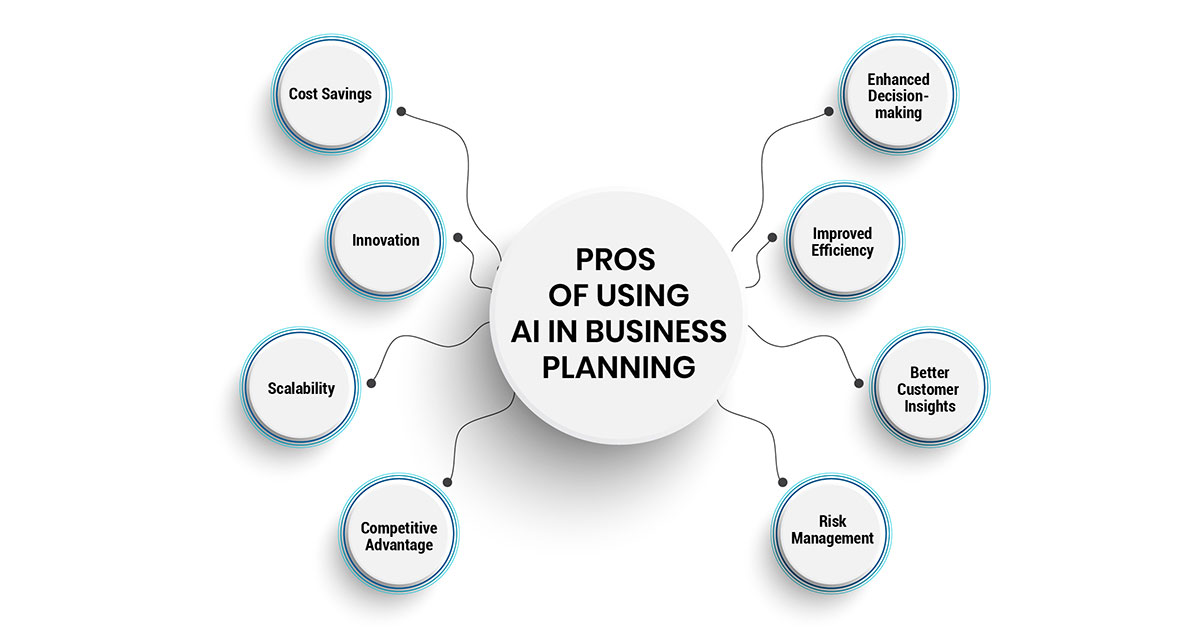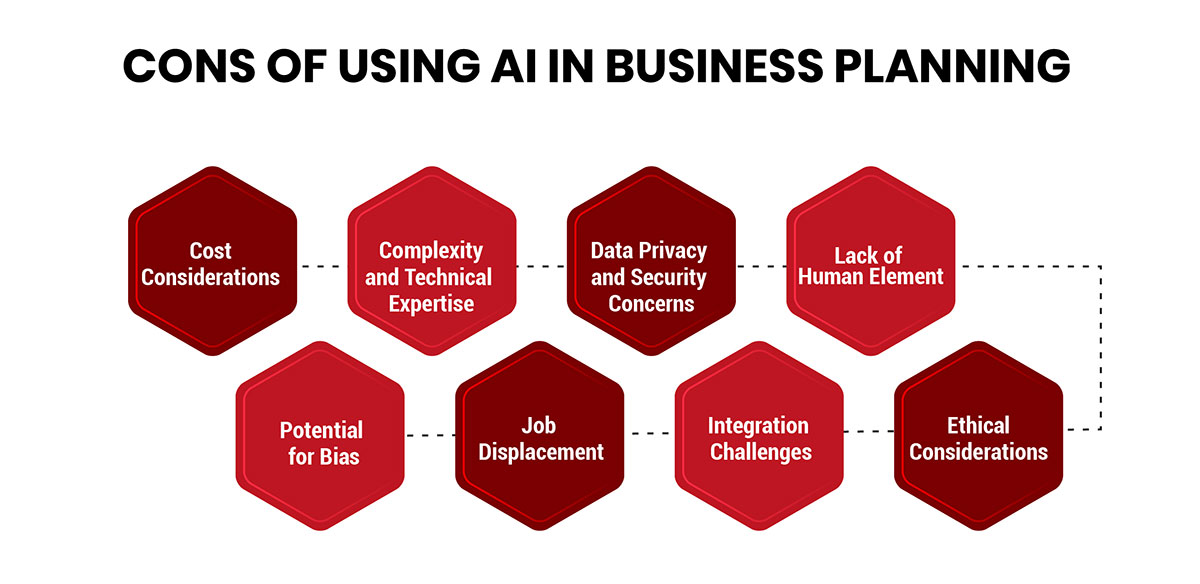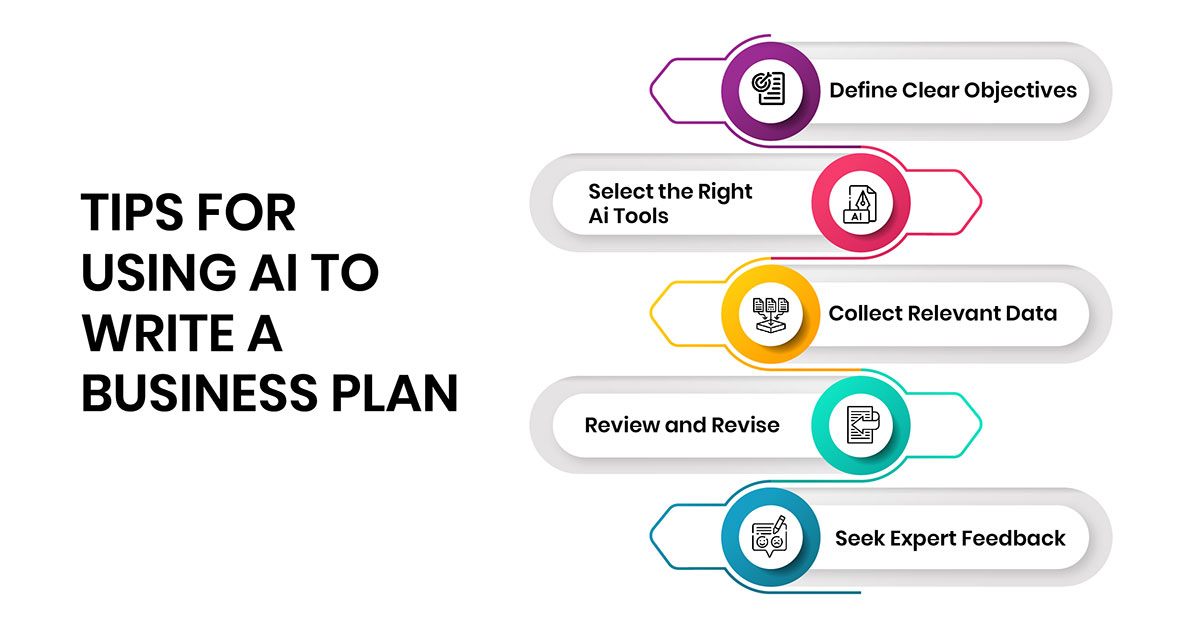Using AI in Business Planning: Pros and Cons
 April 12, 2024
April 12, 2024
In the ever-changing world of strategic management, artificial intelligence (AI) has become a crucial tool for businesses worldwide. With a majority of companies now using or exploring AI, its impact on business planning is profound. This technology is revolutionizing how businesses operate, enabling them to make smarter decisions, boost efficiency, and stay competitive.
While AI offers significant benefits such as improved decision-making and better customer insights, it also poses challenges. Understanding both the advantages and drawbacks of AI in business planning is essential. This article explores the pros and cons of using AI in business planning, providing insights for businesses looking to harness its power effectively.
Pros of Using AI in Business Planning
Incorporating AI into business planning has become a cornerstone of modern strategic management, with research indicating that more than 77% of companies globally are using and exploring AI. It offers a multitude of benefits that drive its adoption across various industries. This transformative technology revolutionizes the way businesses operate, enabling them to make smarter decisions, enhance efficiency, and stay competitive in today's dynamic market landscape.
The key advantages of leveraging AI in business planning, highlighting its pivotal role in driving organizational success are as follows:

-
Enhanced Decision-making
AI empowers businesses to make more informed decisions by analyzing vast amounts of data quickly and accurately. This data-driven approach enables organizations to gain valuable insights into market trends, customer behaviour, and competitor strategies, allowing them to develop more effective business strategies and capitalize on emerging opportunities.
-
Improved Efficiency
By automating repetitive tasks and streamlining business processes, AI enhances operational efficiency and productivity. AI-powered tools can handle complex calculations, data analysis, and report generation with ease, freeing up employees' time to focus on higher-value tasks that require human creativity and problem-solving skills. Studies show that AI can increase productivity by up to 40%.
-
Better Customer Insights
AI enables businesses to gain deeper insights into customer preferences and behaviour. This helps them tailor their products and services to meet evolving customer needs. Personalization powered by AI can increase revenue by 40% compared to businesses that do not personalize their offerings (Source: McKinsey). By analyzing customer data, businesses can personalize their marketing efforts, improve customer engagement, and build stronger, more loyal customer relationships.
-
Risk Management
AI plays a crucial role in identifying and mitigating risks by analyzing data for potential threats and vulnerabilities. Businesses can proactively identify and address potential risks by leveraging AI-powered risk management tools. This reduces the likelihood of costly errors and ensures business continuity.
-
Competitive Advantage
Businesses that embrace AI in their planning processes gain a significant competitive advantage. By leveraging AI to analyze market trends, competitor strategies, and consumer behaviour, businesses can stay ahead of the curve and identify new opportunities for growth and expansion.
-
Scalability
AI-powered tools are highly scalable, making them ideal for businesses of all sizes. Whether a business is just starting or looking to expand its operations, AI can help automate processes, improve efficiency, and support growth without the need for significant investments in infrastructure.
-
Cost Savings
AI can help large businesses save money by automating repetitive tasks, reducing the need for manual intervention, and improving overall efficiency. By streamlining processes and optimizing resource allocation, businesses can achieve cost savings and improve their bottom line.
-
Innovation
AI fosters innovation by enabling businesses to explore new ideas, develop innovative products and services, and stay ahead of the competition. Businesses can get new opportunities for growth and innovation, driving long-term success and sustainability by leveraging artificial intelligence.
Cons of Using AI in Business Planning
Artificial intelligence (AI) has gained popularity as a tool for business planning and has many advantages. However, it's essential to acknowledge the challenges and limitations associated with AI implementation in this context.
The cons of using AI in business planning, and providing insights to help businesses navigate these challenges effectively are listed below:

-
Cost Considerations
The integration of AI technology can incur substantial costs, especially for small and medium-sized enterprises (SMEs). These expenses include acquiring AI software, hardware, and training personnel. Additionally, ongoing maintenance and updates contribute to the overall cost, making AI implementation financially daunting for some businesses.
-
Complexity and Technical Expertise
AI technology is intricate and requires a certain level of technical expertise to understand and implement effectively. This complexity can pose a challenge for businesses lacking the necessary resources or expertise, hindering their ability to leverage AI's full potential in their planning processes.
-
Data Privacy and Security Concerns
AI heavily relies on data, raising concerns about data privacy and security. Businesses must ensure that sensitive information is protected and comply with regulations such as the General Data Protection Regulation (GDPR). Failure to address these concerns can result in reputational damage and legal repercussions.
Also Read: Data Analytics in Today's Business Landscape: A Necessity, Not an Option
-
Lack of Human Element
While AI excels at automating tasks and analyzing data, it lacks the human touch. In business planning, where empathy and intuition play a significant role, the absence of human involvement can lead to oversights or misinterpretations that may impact decision-making.
-
Potential for Bias
AI algorithms are susceptible to bias, reflecting and potentially amplifying existing biases present in the data used to train them. This bias can lead to unfair or discriminatory outcomes. This further undermines the credibility and integrity of the planning process.
-
Job Displacement
The automation of tasks through AI technology has the potential to displace certain jobs, particularly those that are routine and repetitive. While AI can create new job opportunities, businesses must address the risk of job displacement and provide reskilling or upskilling opportunities for affected employees. According to a recent survey, 24% of workers are concerned that AI could eventually make their employment obsolete, with that percentage being twice as high in some areas.
-
Integration Challenges
Integrating AI into existing business processes can be challenging, requiring significant time and effort. Businesses may encounter difficulties in adapting their workflows and systems to accommodate AI technology, leading to disruptions in operations.
-
Ethical Considerations
AI raises ethical considerations, particularly regarding decision-making and accountability. Businesses must ensure that AI is used ethically and responsibly, taking into account the potential impact on stakeholders and society as a whole.
Despite these challenges, businesses can mitigate the cons of using AI in business planning by investing in proper training and education, implementing robust data privacy and security measures, and fostering a culture of ethical AI use. By addressing these challenges proactively, businesses can harness the power of AI to drive innovation, improve decision-making, and achieve their strategic objectives.
Tips for Using AI to Write a Business Plan
By following the tips given below, you can use AI to create a comprehensive and well-informed business plan that supports your business goals and drives success.

-
Define Clear Objectives: Begin by clearly defining your business goals and objectives. This will help you select the right AI tools and ensure that your business plan is tailored to meet your specific needs and align with your overall strategy.
-
Select the Right Ai Tools: Choose AI tools that offer features such as data analysis, financial forecasting, and industry benchmarking. Consider user-friendly tools compatible with your existing systems to maximize efficiency.
-
Collect Relevant Data: Gather relevant data about your business, market trends, and competitors to provide the AI tools with the information they need to generate accurate insights and recommendations for your business plan.
-
Review and Revise: While AI can help draft your business plan, it's essential to review and revise the document yourself. This ensures that the plan is clear, concise, and error-free, reflecting your unique business needs and goals.
-
Seek Expert Feedback: Before finalizing your business plan, seek feedback from industry experts, mentors, or advisors. Their insights can help you identify any gaps or areas for improvement, enhancing the overall quality and effectiveness of your plan.
Parting Notes
In summary, while AI presents compelling advantages for business planning, it's crucial to acknowledge and address the challenges it poses. By understanding these limitations and taking proactive steps to mitigate them, businesses can effectively utilize AI to create comprehensive and well-informed business strategies.
With the right approach, AI can empower organizations to make smarter decisions, enhance operational efficiency, and gain a competitive edge in today's business world.




